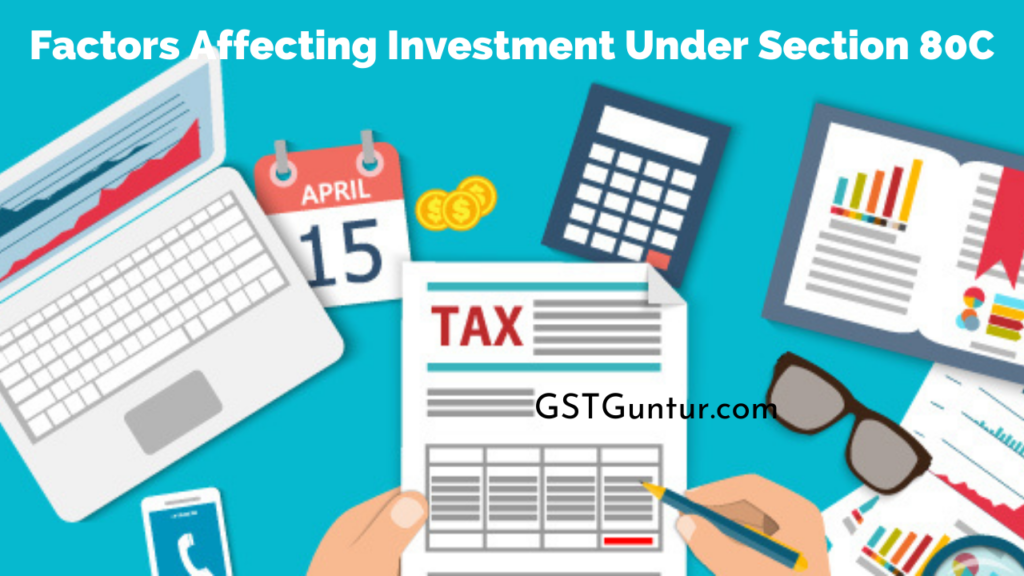Factors Affecting Investment Under Section 80C: One of the best ways when it comes to saving income tax is to declare all the investments under Section 80C. Any individual or HUF can save up to 1,50,000 just by declaring all the investments and expenses under section 80C of the Income Tax Act.
In the process of saving income tax, many taxpayers end up with so many other problems by investing in too many instruments such as LIC, Bonds, Stocks, FDs and so on. On this page, let’s understand what are the factors that affect investments under Section 80C.
- Factors Affecting Investment
- Factors Affecting Investment Under LIC
- Factors Affecting Investment Under Tax Saving Term Deposit
- Factors Affecting Investment Under PPF
- Factors Affecting Investments Under Mutual Funds
- FAQs on Factors Affecting Investment Under Section 80C
Factors Affecting Investment
New investors are currently making a choice from a wide range of investment opportunities through financial institutions and online investment companies. Irrespective of whether you decide on an investment yourself or using a professional, a number of factors are necessary to take your investment options into consideration.
Some of the factors affecting investment are:
- Rate of interest (the cost of borrowing)
- Economic changes
- Confidence/expectations
- Environmental developments (productivity of capital)
- Financial availability by banks
- Depreciation wage costs, inflation, government policy
Factors Affecting Investment Under LIC
- Policyholders have ignored some current policy premiums expenditures. In addition, life insurance is typically bought only indirectly for others and for the insured person.
- Cash surrender values are usually less than the premiums paid over the first several years of policy and, if the policy is surrendered, a policyholder can sometimes not redeem the premiums paid.
- In particular, the decision on life insurance purchases and placement of the life insurance can be complex when it is used for estate planning, business or complex family situations.
| Return on cashback policy | 8% to 10% (approx.) |
| Return on term insurance | 0% |
| Lock-in period for 80C in single premium policy under | 2 years from the date of commencement |
| Lock-in period for 80C in any other policy | 2-year premium |
| Receipt | Exempted (any cashback as well as maturity amount) |
| Liquidity | The surrender option is available only after paying a premium for three complete year |
Factors Affecting Investment Under Tax Saving Term Deposit
- Fixed Returns: Although returns do not proceed south, and a certain percentage of returns is guaranteed, the concept prevents greater returns.
- Lock-in period: FD accounts have a specified lock-in period selected by customers. Prior to maturity, the investment can only be liquidated at the cost of a rate penalty promised, which is only a loss.
- Limited tax benefits: Although individuals choose to save tax in a safer manner on a five-year tax saver account, the returns from the account are taxable in accordance with the Income Tax Act.
Factors Affecting Investment Under PPF
- The fact that PPF has a 15-year lock-in period is a major disadvantage. During the first six years, you are unable to withdraw even partially from it.
- By investing in PPF, you lose your liquidity due to the lock-in period.
- It is not suitable for those wishing to make significant investments. With a PPF investment, there is a limit of 1.5 lakhs every year.
- The PPF interest rate may not be able to protect your invested capital in the event of high inflation in the economy.
- Market-linked products, such as mutual funds, are traditionally considered to deliver higher returns, despite the fact that they give a consistent rate of interest.
- You can only use PPF in an individual capacity if you want to. Only in the case of a minor can a joint PPF account be formed.
Factors Affecting Investments Under Mutual Funds
- No Portfolio Control: Investors in the portfolio of mutual funds have no control over their investment funds. Professional fund managers manage and manage mutual funds.
- Fees for Management: For their management services, investors must pay a charge to fund managers. The charges will increase investors’ expenses.
- No Return Guarantee: There is no guarantee for investors’ returns from mutual funds. Market risk shall apply to investments in mutual funds.
- Lock-in-period: Mutual funds will be locked for longer periods of 4 to 6 years. Investors cannot withdraw their funds prior to the maturity period of such investment.
- About Divergence: The over-diversification of the portfolio is another disadvantage of investing in mutual funds. Portfolio diversification can spread the risk, but it cannot maximise the return. In other words, it is quite difficult to manage a very diverse Portfolio.
FAQs on Factors Affecting Investment Under Section 80C
Question 1.
What are the investments eligible under 80C?
Answer:
Some of the investments which can be made under Section 80C of the income tax act are PPF, NSC, NPS, Tax saver FDs, Post Office Term Deposit, ELSS, ULIP, Senior Citizens Savings Scheme, Sukanya Samridhi Account.
Question 2.
How can I save tax on 2020-21?
Answer:
The best way to save tax is to invest in various tax saving schemes such as Equity-Linked Saving Scheme, NPS, SSY and so on. But one must also be smart enough to know when to opt for the new regime.
Question 3.
Is it good to invest in Post office savings schemes?
Answer:
The rates available under post office savings schemes for various savings instruments vary between 4% and 9%. The fixed deposit interest ranges from 6 to 8%. The interest rate on the fixed deposit of the major banks is currently low in comparison with various saving schemes offered by the Post Office. However, the interest offered by the banks on PPF and SSY schemes is the same as the government determines their interest rate.
